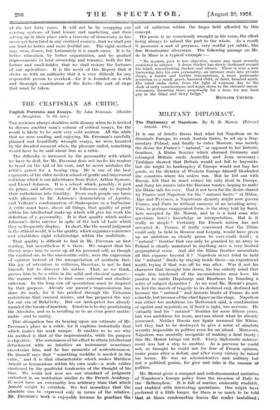THE CRAFTSMAN AS CRITIC.
THE reviewer always shudders with dismay when he is invited to discuss another man's volume of critical essays, for the result is likely to be such very cold mutton. All the while that we were reading, and enjoying, Mr. Freeman's carefully planned and beautifully wrought essays, we were haunted by the dreaded moment when, the pleasure ended, something would have to be said about him as a critic.
The difficulty is increased by the personality with which we have to deal, for Mr. Freeman does not invite his readers to tread on the tail of his coat, and he never mistakes the critic's garret for a boxing ring. He is one of the best exponents of the elder modern school of gentle and impersonal criticism which is our inheritance from Pater, Arthur Symons, and Lionel Johnson. It is a school which, possibly, is past its prime, and affects some of its followers only to degrade their catholicism into timidity. From such people one turns with pleasure to Dr. Johnson's denunciation of Lycidas, and 'Voltaire's condemnation of Shakespeare as a barbarian. A 'Critic must have, above all things, that quality of pride within his intellectual make-up which will give his work the definition of a personality. It is that quality which makes Johnson's dicta survive in spite of the lack of taste which they so frequently display. In short, like the moral judgment in the ethical world, it is the quality which organizes coherence and establishes right relationships within the multitude.
That quality is difficult to find in Mr. Freeman on first reading, but nevertheless it is there. We suspect that his theory urges him to cover up all his personal self, as though the cardinal sin, in the unscientific critic, were the expression of opinion instead of the interpretation of aesthetic fact. His joy of adventure in criticism, therefore, is not to find himself, but to discover his author. That, as we think, proves him to be a critic in the solid and classical manner— the manner which tries to find some external and absolute criterion. In the long run all speculation must be inspired by that purpose. Already our parent's impressionism has done its work, for it has pricked through the Victorian restrictions that encased science, and has prepared the way for our era of Relativity. But our Arch-priest has already sounded the tocsin of reaction. Einstein is to-day proclaiming the Absolute, and so is recalling us to an even purer mathe- ]natic—and to sanity.
This divagation has its bearing upon our estimate of Mr. Freeman's place as a critic, for it explains historically that which makes his work unique. It enables us to see why his method is that of the impressionists, while his purpose is objective. The seriousness of his effort to attain intellectual detachment with so intuitive an instrument sometimes oyerstrains him, and he has moments of sententiousness. He himself says that "something rocklike is needed in the critic," and it is that characteristic which makes Matthew Arnold so harmonious within his own scale—a scale rather straitened by the positivist tendencies of the thought of his time. We could not now see our standard of judgment embodied in an institution similar to the French Academy. It must have an externality less arbitrary than that which Arnold sought to establish. We feel nowadays that the absolute can be expressed only in terms of the relative. Mr. Freeman's work is enjoyable because he practises the
art of criticism 'Within the larger field afforded by this concept.
His prose is as consciously wrought as his verse, the effort being always to submit the part to the whole. As a result it possesses a soft of greyness, very restful yet subtle, like fine Renaissance silverware. The following passage on Mr. de In Mare is a typical example :—
" No modern poet is less objective, scarce any more severely restricted in subject. A dense thicket has slowly darkened around his mind, concentrating shadow and silence. There is ever a new burrowing into his own personality, an intenser stare into private deeps, a fonder and farther retrospection, a more passionate reversion to a small, grave, haunted child, or faint, haunted spirit. His mind sinks down, from the light of common day to the dusk of early consciousness, and again down to the obscurer uncon- sciousness, thrusting there perpetually for a door, for any least gap in the blind and dewy hedge."
RICHARD CHURCH.


































 Previous page
Previous page